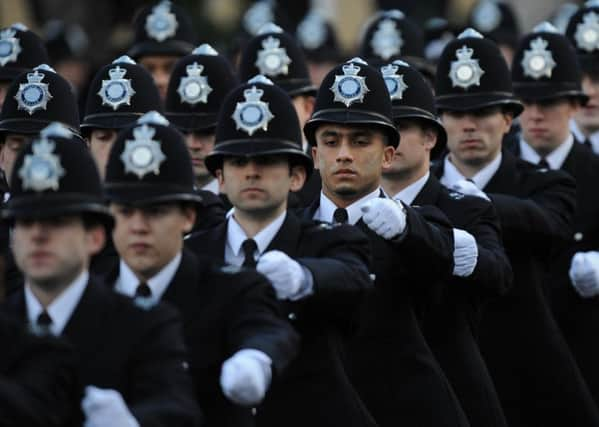‘22,000 police jobs could be axed’ due to spending cuts


An estimate circulated among police chiefs suggested at least 22,000 posts could be lost, according to the Guardian.
The forecast is said to be based on a 25% fall in central funding provided by government for policing between now and 2020.
Advertisement
Hide AdAdvertisement
Hide AdPolice workforce figures show that in March there were 126,818 officers working in the 43 forces in England and Wales. The overall workforce, including civilian staff, stood at 207,000.
Almost 17,000 officer roles are estimated to have been shed after the last round of cuts under the coalition government.
The Home Office, which shares out cash to forces, is among unprotected departments told by the Treasury to prepare proposals that would achieve savings of 25% and 40% by 2019/20.
Senior officials and police have reportedly met to formulate arguments ahead of the final decision in November’s spending review.
Advertisement
Hide AdAdvertisement
Hide AdShadow policing minister Jack Dromey said: “Tory cuts to the police on this scale pose a risk to public safety. They could see the police becoming ever more remote from the communities they serve and vital police community support officers becoming a thing of the past in forces all over the country.
“This threatens to end a generation of progress in crime reduction as neighbourhood policing is hollowed out.
“David Cameron and Theresa May need to think long and hard about the impact that the Tory plan for slashing of the police budget will have on the safety of communities.
“The Government should come clean about the numbers of frontline police that we are going to lose over the next five years.”
Advertisement
Hide AdAdvertisement
Hide AdThe Home Office said no decisions have been taken on police funding beyond 2015/16. The core government grant for this financial year is £7.8 billion.
Policing Minister Mike Penning said: “Police reform is working. Over the last five years, frontline services have been protected, public confidence in the police has gone up and crime has fallen by more than a quarter, according to the independent Crime Survey for England and Wales.
“There is no question that the police still have the resources to do their important work. What matters is how officers and staff are deployed, not how many of them there are in total.
“The changes the Government have made since 2010 have made it easier for the police to do their job by cutting red tape, scrapping unnecessary targets, and giving officers the discretion to use their professional judgement.
Advertisement
Hide AdAdvertisement
Hide Ad“Decisions on the operational deployment of resources are matters for chief constables in association with police and crime commissioners.”
Controversy erupted earlier this year when Sara Thornton, chair of the National Police Chiefs’ Council, suggested that police may not be able to continue attending every burglary in the face of fresh austerity.
In May, Home Secretary Theresa May accused the Police Federation, which represents rank-and-file officers, of “crying wolf” after it issued a string of alarming warnings about the impact of austerity.
ends
In a statement on Tuesday, Ms Thornton said the NPCC will submit a position about the impact of budget cuts.
Advertisement
Hide AdAdvertisement
Hide Ad“We are expecting cuts to the policing grant of between 25-40% in the next spending review on top of reductions of about 25% in real terms in the last five years,” she said.
“As a result, we are likely to have lost 70,000 police posts by 2020.
“The NPCC has been bringing forces together to think carefully about how we respond to the twin challenges of deep reductions in our budgets and changing crime and demand on the service.
“I have been clear that we have to make fundamental changes to the way we police; if we don’t we will fail the public a